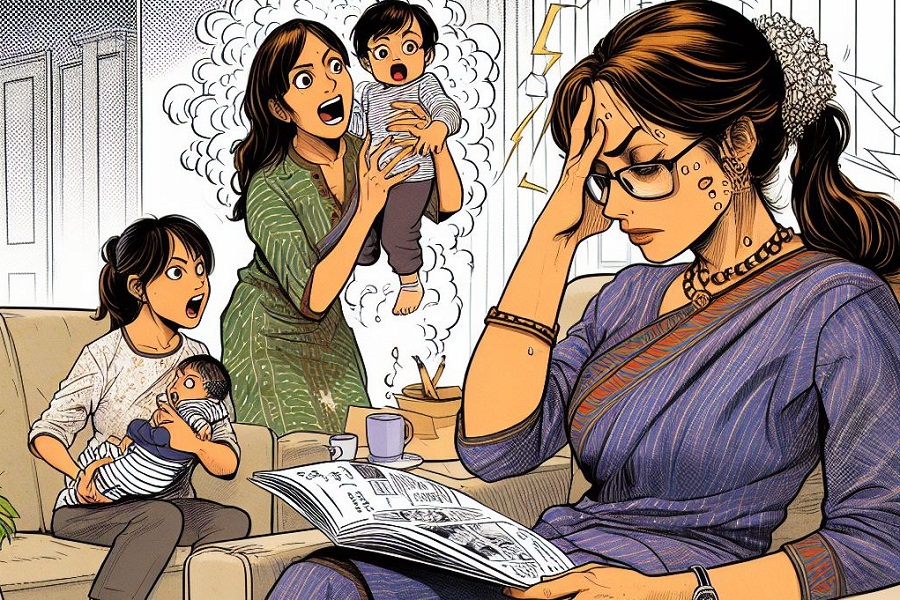
Published :
Updated :

Mothers can do almost everything, and this notion is prevalent in our subcontinent as we grow up watching them do nearly everything. However, in previous generations, mothers could not work outside and earn a wage. So, the children watched them only do the house chores, and we got used to it. In the later years, the scenario changed. Mothers started going outside, went to the office, and ran a business, and to our very astonishment– mothers studied. But even after taking on so many other duties, Mother remained mother to the child, society, and extended and close families. In this period, we created a superwoman idea of a mother, which eventually coined the term 'Supermom'. Being a super mom proved like the biggest scam of a woman's life, and now, they have to do double jobs. We cannot forget another emotional quote: "Being a mother is a full-time job." It is, indeed. And multiple jobs simultaneously, the pressure of being a supermom got on the nerves of mothers around us.
Let's look at the characteristics that society expects when a woman becomes a supermom in their eyes.
She must be able to wake up earlier than everyone at home and prepare breakfast, make the children ready to go for the day and then prepare herself to start for her professional place. A supermom must visit all the social gatherings with a smiley face that does not complain. Complaining is not her thing– they say. She must pull it all together to be a modern woman. If a woman is not doing everything at home and outside, then the 'crown' of supermom is not for her. But the more important question comes later. Do women want that crown at all? No, women want to have their fair share of sleep and a chance to flourish in academia, office startups, or whatever passion they choose without guilt.
Protima Rani Dutt has been working in a government job for 30 years and is now retired. She started her career in 1980, married in 1981, and became a mother in 1984. This chronology allowed her to be a supermom, even if unfamiliar with the term. She knew she had to do it all, and it seemed natural to her.
Bringing up the children presented many challenges while performing the duties, but she thanked the housekeeper, her mother, and her brothers, who were a great help in her child-rearing.
Managing a working mother's role left some guilt in her mind, which we would not even expect from a man's perspective– "I think I have not been able to be there for my kids when they needed me all the time. I had to be away. I had nannies and caretakers for them, but the guilt still stayed. Maybe in our society, guilt is pervasive for a working mother."
Rafika Toma is a mother from this generation. She is pursuing her education at the University of Dhaka after becoming a mother, and it has not been easy for her either– "My child needs attention all the time, and there is no taking a break. I have to wait for him to sleep and study during the exams. In our society, a mother does not only have to take care of her child, work or study– she also needs to take care of the home. If one gets enough help from other family members, it would be a bit less difficult."
Being a supermother is neither Mrs Dutts's nor Rafika's desire nor a taken-for-granted duty. But they have been a part of it and continued with the norm that they had to deal with just because, as individuals, they wished to create a unique identity of their own.
Whether professional or educational, these 'supermoms' had to pay their toll on the concept that mothers can do it all. But we need to remember one thing while praising this notion; being able to do everything does not compulse a person to do everything all the time. The choice should not be imposed upon any person, let alone the mothers who carry us in the womb for ten months. The glorified crown of a supermom should not be passed to women through generational legacy, but we also should tell them that it is OK not to be OK.
They can rest, make mistakes, choose not to be mothers, or do whatever their gut feeling tells them. Being a mother and something else should be a choice for every woman standing in the crowd. Ideas like 'Supermom' can take a resting chair because the era is still progressing, and imposed ideas are not part of it.


 For all latest news, follow The Financial Express Google News channel.
For all latest news, follow The Financial Express Google News channel.